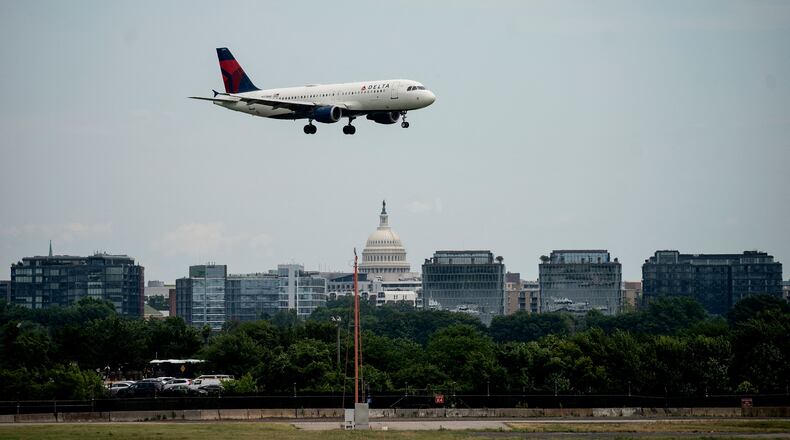Washington, D.C.’s Reagan National Airport has long been a favorite of Beltway insiders and lawmakers for its location just across the Potomac River from the seat of federal power.
Now a fight is brewing in Congress over allowing more long-haul flights into the D.C. metro’s smallest commercial airport, pitting Atlanta-based Delta Air Lines against a key rival and some prominent local forces in Washington.
For decades, most of the flights out of Reagan National Airport have been limited to ones within a 1,250-mile perimeter, curbing flights to the Western U.S. The limits were put in place years ago to protect Washington’s Dulles International Airport, which then was destined to become the region’s dominant hub, and to control congestion at National.
Delta wants to change that. But the carrier is flying into stiff resistance from United Airlines, which operates a hub at nearby Dulles International, as well as D.C.-area members of Congress and the airport authority.
To increase flights from National — and add more beyond the 1,250-mile perimeter — would require an act of Congress. And that’s exactly what Delta is seeking.
U.S. Rep. Hank Johnson, D-Lithonia, has introduced legislation that would allow airlines to add 28 roundtrip flights a day from National — a 13% increase — without any limitations on distance.
“By limiting the number of flights in and out of National Airport, we are squeezing consumers — they are the ones paying the price,” Johnson said in a written statement.
The National perimeter rule change is one of many proposals that advocates want included in the Federal Aviation Administration reauthorization bill, introduced Friday, which must be approved every five years and thus becomes a vehicle for many pieces of aviation legislation.
The perimeter bill has more than 30 bipartisan cosponsors, including U.S. Reps. Lucy McBath, Sanford Bishop, Drew Ferguson and Buddy Carter from Georgia. The lead co-sponsor is Republican U.S. Rep. Burgess Owens of Utah, where Delta also has a hub, which would benefit from a law change.
Credit: Nathan Posner for the AJC
Credit: Nathan Posner for the AJC
Delta said in a written statement that it wants Congress to “closely examine this issue” and work “to modernize the outdated perimeter rule.”
Atlanta is within the 1,250-mile perimeter from Washington. But for Delta, the fight to gain more flying rights at National — known as slots — is part of a broader strategy to improve its competitive position at the airport that is closest to the nation’s capital.
Also pushing the bill are airports in western states. A group backed by Delta and the airports, called the Capital Access Alliance, argues adding longer flights would improve access to Washington and boost competition and consumer choice.
“More competition lowers ticket prices,” said Capital Access Alliance spokesman Brian Walsh.
In a statement, Delta said the perimeter rule has “unintentional consequences ... costing customers time and money.”
On political issues, Delta is “pretty proactive on advocating for themselves,” said Brett Snyder, a former airline manager and author of crankyflier.com. While other airlines may defer to a consensus opinion from an industry lobbying group, “Delta is more than happy to go it alone and make some waves,” he said.
Push back
Among the most influential opponents to the bill is the Metropolitan Washington Airports Authority (MWAA), which operates both National and Dulles, and a number of D.C.-area lawmakers.
MWAA says the perimeter rule and slots help maintain the balance between “small, space-constrained and over-crowded Reagan National (DCA) and the much-larger Dulles International (IAD).”
MWAA President Jack Potter said National “simply cannot accommodate all the flights that airlines want to send to Washington.”
“Politicians and corporations from other parts of the country should not dictate how the D.C. region’s airports operate,” MWAA said.
A recently-formed opposition group argues that changes to the perimeter rule and added flights at National would incentivize airlines to reduce flights to communities within the perimeter in Georgia, Ohio, Texas, Vermont, Virginia and West Virginia.
Walsh, speaking for the Delta-backed coalition, said that’s not so and regional airports “only stand to benefit from this bill through stronger direct service to and from DCA.”
Credit: Carolyn Kaster
Credit: Carolyn Kaster
There’s some irony in Delta’s new National push.
For decades, Delta has fought creation of a second metro Atlanta commercial airport to protect its dominance here. Yet, its push for changes at National could help it chip away at rivals in D.C.
Proponents of changing the perimeter rule say Dulles has matured into a major hub, and that the rule to protect its development through the restrictions at National is antiquated.
But the FAA in late May issued a memo calling into question some claims made by the Delta-backed group.
The FAA said a Capital Access Alliance report claiming to show National can support additional flights “is flawed and does not directly tie to the physical airport capacity.”
National is “more delay prone than most other airports,” and an increase of 25 daily round trip flights would increase delays by 33%, according to the FAA.
Another historical wrinkle is that a little over a decade ago, Delta sought government approval to give up dozens of slots at National.
That’s because it had engineered a deal to trade slots at National with US Airways in exchange for more slots at LaGuardia Airport — which Delta has since used to establish a domestic hub in New York. American inherited the slots at National when it merged with US Airways.
Now Delta wants more flights in and out of National.
About the Author
The Latest
Featured




